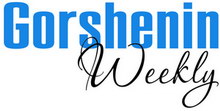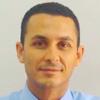
Prosecutor's office sends materials of new case against former Prime Minister Yuliya Tymoshenko to court 
(2 Mb)

ISSUE #12
04/02/2012
A court will start to consider a new case launched against former Prime
Minister Yuliya Tymoshenko in the nearest future.
On 29 March 2012, Kharkiv Region's prosecutor Hennadiy Tyurin said that the
prosecutor's office had submitted to the Kharkiv Kiev district court materials of the
criminal case against Tymoshenko over alleged fraudulent activity of the United
Energy Systems of Ukraine (UESU) company. READ MORE
- Gorshenin Weekly |
Published on EGF: 05.04.2012
| External Relations
-
Parliament starts to deal with implementation of PACE resolution 
(2 Mb)

ISSUE #11
03/26/2012
On 21 March 2012, the Ukrainian parliament adopted in the first reading a
bill on the implementation of a resolution by the Parliamentary Assembly of
the Council of Europe.
The author of the document, MP of the pro-government Party of Regions Ivan
Popesku, said that “the draft resolution was stripped of political pressure and a
political overtone. It envisions the implementation of the EU requirements by
Ukraine in the section on the need to align the Ukrainian legislation with the EU
norms and standards and, in particular, in the judicial sector.” READ MORE
- Gorshenin Weekly |
Published on EGF: 29.03.2012
| External Relations
-
EGF Middle East Briefing - Egypt’s New Political Landscape: between Democratization and Old Legacies  Claudia Nocente
Claudia Nocente
EGF Researcher, Global Security
Egypt’s Islamic state on the horizon
Egypt is once again in the headlines. The results of the first, allegedly, free elections after the ousting of Hosni Mubarak as the Egyptian president are causing widespread concern, especially in the West, about the country’s process towards democratization. Many fear that the legacy of the former political establishment will haunt the country for many years to come. Egyptians have been denied any aspect of a wealthy social and political life and are now concerned about the fruits of their courageous actions and the new seeds last year’s events have implanted. What will Egypt look like a year from now? Will it end up embracing a hardline Islamist direction in the administration of political power? READ MORE
- Claudia Nocente |
Published on EGF: 22.03.2012
| External Relations
-
Post-Revolution Tunisia: Still Waiting for Economic Recovery  by Naim Ameur
by Naim Ameur
Expert on political transition in Tunisia and the Maghreb
One year after the Jasmine Revolution of January 14, 2011, Tunisia has successfully advanced in its democratic transition and political reform process. The election of the National Constituent Assembly (NCA) held on October 23, 2011 was well organised, and for the first time in history, it was fair. Al-Nahdha (which means “renaissance” in Arabic), a moderate Islamic party, won 41 per cent of the NCA seats. READ MORE
- Naim Ameur |
Published on EGF: 08.03.2012
| Markets
-
EGF Turkey File 
(156 Kb)
Insights into Turkish Domestic and International Politics
February 2012
Key Points:
- A crisis erupted between state prosecutors and the intelligence service, when members from the latter refused to turn up for questioning regarding an investigation into ties to the PKK. The intervention of prime minister and the parliament have calmed matters for now, but some experts speculate the incident is a result of a break between the AKP and the Gulenist movement.
- Bloodshed in Syria continues while Foreign Minister Ahmet Davutoglu travels to capitals throughout the world in an attempt to drum up support for an UN resolution to stop the violence there. Syrian refugees continue to flood into Turkey’s southern provinces, where the Free Syrian Army is said to be organizing the armed resistance to the regime in Damascus.
- France’s Constitutional Council invalidates the Armenian Genocide draft law passed in January, though both presidential candidates have vowed to push a reworded version upon entering office.
- The cold spell in Turkey shows the weakness in the country’s position as a net importer of gas, while supply issues with Azerbaijan and Iran drastically cut imports amidst increased use in the month. Energy Minister Taner Yildiz met with NABUCCO’s board of partners to discuss the link up of it and TANAP.
READ MORE
- EGF Editorial |
Published on EGF: 08.03.2012
| Markets
-
Briefing on: "The Role of NATO in the Wider Black Sea" 
(106 Kb)
The dynamics of NATO's role in the South Caucasus has been considered against the backdrop of
the Wider Black Sea since both geopolitical and policy reasons make the South Caucasus a too
narrow geopolitical scope for the analysis of NATO's policies. In fact, in contrast to the situation
before the Russo-Georgian war in 2008, the South Caucasus is currently very rarely referred as
such in NATO's statements, except for the cases where the Alliance is expressing concerns over
the settlement of the "frozen conflicts". READ MORE
- George Vlad Niculescu |
Published on EGF: 08.03.2012
| External Relations
-
Former Ukrainian interior minister found guilty, sentenced to four years behind bars 
(2 Mb)

ISSUE #8
03/05/2012
On 27 February 2012, the Kiev Pecherskyy district court sentenced former
Ukrainian Interior Minister Yuriy Lutsenko to four years in prison with
property confiscation.
The court found the former minister guilty of embezzlement and the appropriation
of budget funds, which had inflicted the loss of 85,500 dollars on the state. READ MORE
- Gorshenin Weekly |
Published on EGF: 07.03.2012
| External Relations
-
